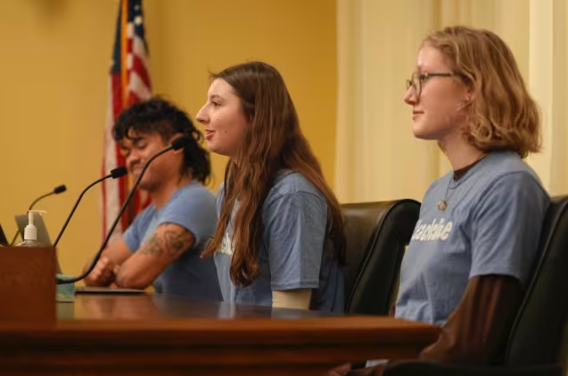Rattle, clang, bash.
Branches, leaves, and rain slam into my bedroom window.
I knew what was coming when the sky started to transition into a green-yellow color. Even though I could predict it, it didn’t make sitting through it any easier.
As a 5-year-old, I only thought about what the weather was like. While I didn’t ponder the bigger picture of changing climate patterns, I noticed the increasing number of tornadoes. My least favorite days were those characterized by the blaring siren and sitting in the hallway in my basement while over the radio “Hennepin County, Minnesota” was repeated in a robotic voice telling us to take shelter.
What kind of kid wasn’t scared of tornadoes?
Although the immediate fear was rational, my anxiety around severe weather began to consume my life. I was afraid to go outside to see my friends at the park or to go to sports practices because I didn’t want to see any signs of a severe storm. In order to try and minimize this fear, my parents began to rationalize this phenomenon to me. They hoped this would ease my anxiety.
“Well, Lucia, the weather is changing frequently now.”
“What do you mean?” Nothing quite like the idea of constant change to calm down a kid who ran on routine. “Does this mean I have to get used to tornadoes? Do I have to accept them?”
They reassured me that I didn’t have to think about it too much, and that even now tornadoes won’t be happening that frequently. After some exposure therapy that included watching tornado documentaries and reading books about them, my fears began to subside.
I assumed that my anxiety around tornadoes existed in a vacuum, something that wouldn’t come back later in my life. But just a few years later, it manifested itself in another fear of mine.
At eight-years-old, with so much room in my brain that was once filled with fears about tornadoes, I was looking for a new fixation. This soon became snowboarding. Most of my nights were spent deep in piles of snow, and I found tranquility in the sport that I soon realized would be a lifelong passion of mine.
I continued to shred, carve, and turn through the next few years of my life. I didn’t think about tornadoes as much, but I was starting to think about snow. My seasons were being cut shorter each year, and when we did have snow, it was no longer the fluff I learned on. I began to fall into slush, and weather patterns yet again became my main concern.

This time though, I could understand the climate crisis beyond the big ideas. I was able to digest research, science, and really began to understand the implications of what was happening in our atmosphere.
I would be wrong to continue to tell my climate story without acknowledging how much of a privilege it was for severe weather to be the first negative impact I felt from climate change. That being said, it served as the catalyst to get me involved in the fight against global warming and allowed me to open my mind to other people’s stories about their tragedies due to climate change.
Now that I was older, every chance I got I took to talk about the climate crisis. Every middle school project, every conversation. I understood that it was no longer just about tornadoes or snow, but something much more dire. Something that was ruining lives.
When we fell into the pandemic lockdown, I no longer was able to take little opportunities throughout my day to talk about the fight against climate change. Without those little outlets, I had to look for something concrete to do. When I was 13 I sought out nonprofit work and began devoting my time to spreading information about the environment. My interest in the state and corporation’s roles in perpetuating the climate crisis started to grow, and legislation became my outlet.
Once I began my climate activism work, it became abundantly clear to me that severe weather was the tip of the iceberg. People were losing their jobs, their homes, their families, and their entire lives to the climate crisis. This posed the question in my mind: why am I feeling less effects of climate change than those in my state, even those minutes away from me?
This was the moment that environmentalism and social justice could no longer be mutually exclusive to me.
Coming from a white, middle-class family, with parents who both went to college and with extended family that was historically given resources to prosper, I hadn’t experienced the brunt of the climate crisis.
I committed myself to spreading legislation, education, and advocacy plans into place in order to fight against the climate crisis. I realized my fear never was really about the tornadoes themselves, but our inability to control them. I want to work towards a world where I can raise children and ease their anxieties, instead of living in a life of fear surrounding the environment.
Lucia is a Climate Generation Window Into COP delegate for COP29. To learn more, we encourage you to meet the full delegation, support our delegates, and subscribe to the Window Into COP digest.

Hi! I am Lucia Everist, a recent high school graduate from the Twin Cities Metro area. I am extremely passionate about fighting for policy change to combat the climate crisis, and tend to focus on bills related to fossil fuel divestment and climate justice. My work with Climate Generation began last year as a Youth Environmental Activist (YEA!) leader, and I cannot wait to continue my work with the organization at COP this coming fall. I hope to use this experience to share my voice as a youth activist and to spread the message to others about the importance of younger generations being involved in the policy process.






